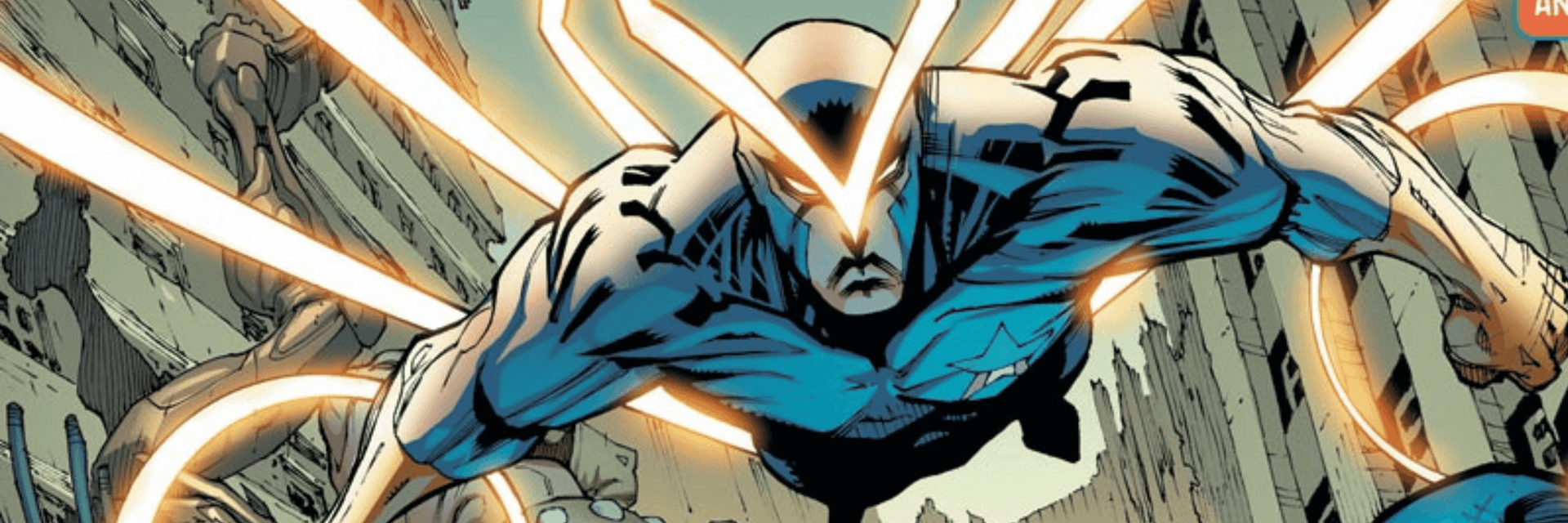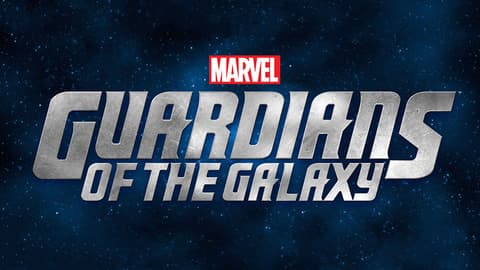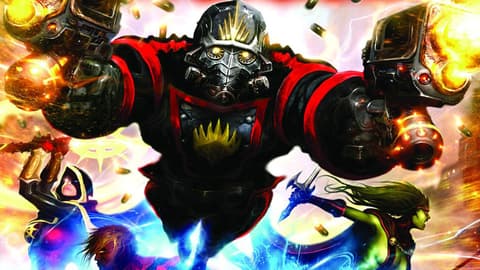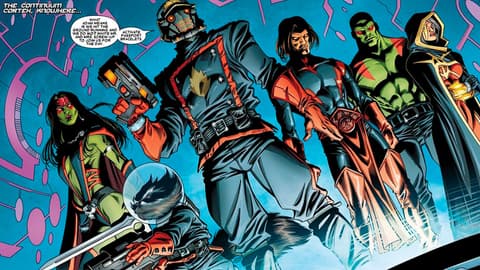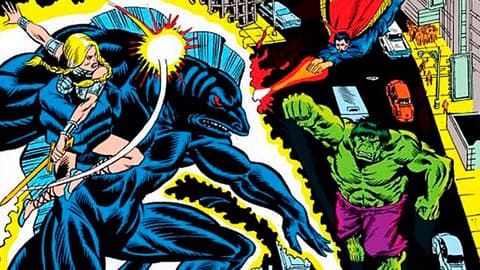Earth-691’s Starhawk uses his quantum-mystic powers to protect the universe as a Guardian of the Galaxy.
Destiny Calls
At the 20th century’s end in Earth-691’s reality, the human hero Wendell Vaughn, AKA Quasar, and Protector of the Universe, learns his lover Kismet, a genetically engineered superwoman, is pregnant. At the time, Earth was under attack by alien invaders, the Martian Masters. Transporting Kismet to the planet Vesper, where the intergalactic Sisters of Mercy care for exotic females, Quasar uses his Quantum Bands to rejoin a battle on Earth against the invaders but miscalculates. He lands near the Abrogate, an all-consuming sentient galactic nexus point, which absorbs Quasar, killing him. What seemed like an accident was actually a plot concocted by the rogue cosmic being Era who had killed Eon and taken her place, all to undermine universal stability and ensure the Martian conquest of humanity. The false Eon then visits Vesper during the birth of Kismet’s child, stealing the newborn infant and hiding him on Arcturus IV.
The False Eon abandons the infant in one of the Forbidden City’s genetic laboratories, where a mutant couple finds him just before the Reavers slay them and wipe out the planet’s last known mutant population. The child’s jumbled memories of these events later lead him to mistakenly assume the slain mutants were his biological parents. Considering the baby’s location, he’s mistaken for a normal Arcturian child and the Reaver Ogord rescues him. The soldier and his wife Salaan already had a young daughter, Aleta, but seeing that they were unable to have a son, Ogord adopts the infant, christening him Stakar.
The baby Stakar’s apparent bravery during his rescue impresses Ogord, but the infant’s calm attitude actually stems from a special state of awareness: The child had lived his life countless times before and instinctively took his safety for granted. As an adult, Stakar’s consciousness would be sent back in time repeatedly to early 21st century Arcturus IV to live his life over and over again. While there were variations in each of these lives, partly due to Stakar’s often futile attempts to change certain aspects of his destiny during each lifetime, Stakar lived much the same life each time he was reborn, carrying those memories with him into the next life; as such, during his many lifetimes he accumulated vast knowledge regarding widely varied subjects, including many future events.
Initially lacking a fully conscious awareness of his past lives, Stakar grows up an isolated, brooding child. An intellectual pacifist within an extremely militaristic society, he becomes a source of embarrassment and frustration to his family, neglecting his combat training for academic studies.
Upon reaching manhood, Stakar instinctively knows it’s time to seek his destiny in the Forbidden City. He tries to sneak out, but Aleta insists on accompanying him, ostensibly to protect him, and they find the Hawk God’s temple—a cosmic being embodying the predatory nature of existence and worshipped by the early Arcturians. Stakar and Aleta find the Hawk God’s “statue” and a cache of long-lost prewar technology. The siblings spend a week exploring the temple while Stakar salvages components to re-create an ancient brain-wave helmet to access the lost knowledge of the ancient Arcturians.
When an angry Ogord and a squad of Reavers enter the city seeking his wayward children, Aleta and Stakar argue over their next move until Aleta throws Stakar’s helmet to the ground in a fit of temper; in response, the helmet releases an energy bolt that converts Aleta to radiant energy, a living beam of light that merges with the Hawk God “statue.” Animating the Hawk God’s form, Aleta is unable to cope with its vast power and goes on an insane airborne rampage, wrecking most of the Arcturian air fleet that mobilized in response.
Using the helmet to contact Aleta’s mind and hearing her cries for help, Stakar realizes he can provide the wisdom she needs to harness the Hawk God’s power. Entering the fray in an Arcturian flitter aircraft, Stakar confronts the Aleta-animated Hawk God effigy and convinces Aleta to join her mind with his. Stakar and Aleta merge, sparking a multinuclear explosion that reduces the surrounding area to a sheet of glass. All that remains at the epicenter of the blast is Stakar, who transforms first into Aleta and then into their new shared form as Starhawk.
As the often-dominant male aspect of this composite Starhawk, Stakar assimilates the ancient Arcturians’ knowledge, presumably via the brain-wave helmet or the Hawk God robot’s computers or both. The experience also unlocks Stakar’s full memories of his past lives, which over time builds up the vastly knowledgeable Starhawk’s reputation as the “One Who Knows.”
In addition, Stakar and Aleta gain cosmic power from the Hawk God, who was apparently freed to depart the mortal plane and resume his true form after Stakar and Aleta destroyed his robotic prison. The Hawk God later claims he had deliberately engineered these events by subconsciously influencing the actions of Stakar and Aleta, creating and empowering the cosmic hero Starhawk as a means of atoning for his many darker acts.
As Starhawk, Stakar and Aleta share a dual existence where only one can manifest physically at a time. Stakar’s consciousness controls their masculine Starhawk form, which can morph into a facsimile of Aleta when her consciousness is dominant.
Luminous Energy
Starhawk can generate vast amounts of luminous energy for various purposes. He can surround part or all of his body in a nimbus of light providing simple illumination up to blinding intensity. He can cast beams of light as spotlights or flares. By shifting the frequency of these light beams, he can generate intense heat beams or coherent light beams that strike their targets with tremendous concussive force. It is unclear whether he still can form stable energy constructs such as shields, discs, ramps or spheres from solidified light—that ability was primarily controlled by Aleta during his merger with her.
By mentally intermingling his light’s photons with anti-graviton particles, Starhawk can surround himself in an energy nimbus to levitate or fly at great speeds. He can reach escape velocity and can even jump to light speed instantly, though he generally does not do so within a planetary atmosphere lest it negatively affect his environment. He can even accelerate to multiples of light speed; at these “multi-erg” velocities he cannot be seen or detected by any known natural or artificial means but can still strike with great physical force upon impact with a target, perhaps temporarily shifting into a state of coherent light during this process. Starhawk can also generate light that heals injured or ailing beings. This ability apparently stems from the predatory insight of the Hawk God, enabling Stakar to discern points of weakness and repair them.
Starhawk has superhuman strength (lifting 2 tons), but can greatly augment that strength within unrevealed limits by reinforcing and super-charging his physical mass and musculature with his light energy, though this requires great effort and can only be sustained briefly. Even without augmentation by his light powers, his stamina, durability and agility are enhanced beyond normal human levels. His reflexes and senses (especially eyesight) are superhumanly keen. He has an extrasensory sensitivity to energy patterns and fluctuations and can track distinctive or exotic energies over great distances.
He is immune to most known diseases and radiation poisoning, and can function within the vacuum of space. He is also apparently immune to the ill effects of solar radiation, and can even emerge from a sun’s interior unscathed, possibly by absorbing the excess energy and channeling it into his light generation and space flight abilities.
He is extraordinarily long-lived, a trait that he may have inherited either from his mother or from his long-term merger with an Arcturian, though it may also be simply an extension of the Hawk God’s power.
Stakar has vast knowledge of many civilizations throughout the Milky Way galaxy and beyond, especially the ancient Arcturians. He has knowledge of future events, though its reliability is sometimes undermined by memory gaps or random timeline alterations. Like some of his alternate-reality counterparts, he may be occasionally mentally linked with his alternate selves in other timelines, accessing their vast collective memories and knowledge through their mental connection. He often conveys a powerfully persuasive sense of truth, wisdom or insight through his presence, his words or even his gaze; interestingly, however, this technique is often far less effective on long-term associates due to the animosity his personality generates.
Starhawk’s costume is composed of unidentified alien materials. He spontaneously manifested the costume during his first transformation into Starhawk and has modified, repaired and re-created it repeatedly since then, suggesting that it might be some type of light construct. The costume’s most notable feature is its solar sails, two sets of retractable glider wings (a small set housed in the cowl and a much larger set housed in the back) that Starhawk can unfurl at will. While Starhawk is capable of flight without his solar sails, they make his flight process easier and faster by harnessing light waves and photonic particles from solar winds to augment the energies that power his flight.
Empowered Enemies
Stakar has a tough relationship with his adoptive father Ogord, on account of Stakar’s pacifist nature and disinterest in their militaristic society. Within moments of Starhawk’s creation, Ogord tries to enlist the new cosmic being in the Arcturian war machine. Starhawk refuses and flies off into space, earning the lasting enmity of Ogord and his fellow Reavers, who blame this refusal and the Hawk God’s rampage for setting back their army’s technological advancement by untold years. This enmity grows more bitter five centuries later when an early Arcturian starship makes first contact with an alien aircraft and tries to seize it. Starhawk disables the Arcturian ship, foiling their attempted piracy, and Starhawk’s demise is declared an Arcturian fleet imperative.
Starhawk goes up against many enemies, such as the alien Brotherhood of the Badoon, the cosmically-empowered and power-hungry Michael Korvac, AKA Korvac, and the Hell Lord Mephisto who drives Stakar and Aleta apart by attempting to influence Aleta.
Fellow Guardians
Stakar becomes close with Ogord’s true daughter Aleta, and even closer when their exploration of the Hawk God’s temple leads to a shared existence. Though sharing a body leaves them lonely and they petition the Hawk God to let them live individually. Once they’re separated, they marry and have three children. When Ogord mind-controls their children to kill Starhawk, the plan fails but leads to the death of all three. This monumental loss drives a wedge between Stakar and Aleta, as Aleta unfairly blames Stakar.
Starhawk is a card-carrying member of the Guardians of the Galaxy in his era. Though he time travels to the modern era of Earth-616 and allies with the heroic Avengers, the Guardians of the Galaxy of Earth-616, and other heroes, such as Peter Parker, AKA Spider-Man, Ben Grimm, AKA the Thing, Her (later Kismet) and Heather Douglas, AKA Moondragon.
A Long-Lived History
Starhawk wandered space for centuries, aiding and befriending beings on a wide variety of worlds. Stakar and Aleta’s spirits eventually grew lonely, however, and Starhawk secretly returned to Arcturus, where they petitioned the Hawk God to allow them temporary existence as individuals. The Hawk God agreed and the pair split into their two separate forms again, living as man and wife. They produced three offspring, and Starhawk existed mostly in Aleta’s form for several years thereafter as she bore and raised their children: Tara, Sita and John. Unable to ignore his foreknowledge of Starhawk’s key role in intergalactic destiny, Stakar eventually resumed dominance of their shared form and spurred them to resume their space adventures as Starhawk, building an asteroid home for their children, which he and Aleta could monitor and contact during their absences.
As of the year 3007, an Earth long since freed from Martian rule had established colonies on other worlds, genetically altering settlers to adapt to life on different planets; however, later that same year, the alien Brotherhood of the Badoon brutally conquered the human federation, wiping out virtually the entire populations of Mercury, Jupiter, Pluto and Centauri IV, and killing or enslaving most of Earth’s people. In response, Starhawk secretly aided and protected four freedom fighters—Charlie-27 (last of the Jovians), Martinex (last of the Pluvians), Vance Astrovik, AKA Major Victory (a thousand-year-old psychokinetic human astronaut) and Yondu Udonta (seemingly the last of Centauri’s blue-skinned natives)—who went on to form the Guardians of the Galaxy, leading the anti-Badoon resistance, though the Guardians were unaware of Starhawk’s role in their origin.
Briefly aided by the heroic Defenders of Earth-616’s modern era, the Guardians eventually led humanity in overthrowing their Badoon masters. Starhawk first revealed himself to the Guardians by assisting the team during these events, and played a controversial role in the war’s end by spurring the benevolent Sisterhood of the Badoon to come to Earth and take their warlike male counterparts into custody. Many humans had wanted to imprison, torture or kill the male Badoon for their war crimes, but Starhawk convinced the Guardians that Earth could best make a fresh start without any further atrocities, so the Guardians and Starhawk helped the Sisterhood remove all the male Badoon from Earth.
Feeling out of place in Earth’s postwar society, the Guardians accepted Starhawk’s offer to reassemble as a team of heroic space explorers; however, while his knowledge and power often proved invaluable, his haughty and secretive manner made him unpopular among his teammates. Aleta, on the other hand, soon became well-liked after she began manifesting among the Guardians. The Guardians soon recruited Nikki, last of the Mercurians; destroyed the cosmic anti-life entity Karanada, an aspect of the star-spanning Topographical Man; and fought the Reavers of Arcturus, now led by High Commander Ogord, who abducted Starhawk’s children and mind-controlled them into trying to kill Starhawk. The Guardians foiled Ogord’s plan, but the children died in the process. Stakar and Aleta were devastated by the loss, and Aleta’s grief gradually twisted into a bitter resentment of Stakar, whom she unfairly blamed for the children’s demise.
Regardless, Starhawk continued to serve with the Guardians, participating in a mission that took the team to Earth-616’s modern era and allied them with the heroic Avengers, who awarded the Guardians honorary membership during their joint pursuit of the cosmic menace Korvac. After further adventures alongside other modern era Earth-616 heroes such as Spider-Man, the Thing, Kismet, and Moondragon, the Guardians returned to their own 31st century reality.
Aleta grew increasingly bitter over her children’s fate and her often long-term confinement within Starhawk. Her bitterness evolved into fanatical hatred of Stakar thanks largely to the subliminal influence of the demon lord Mephisto, who had targeted Aleta because she was fated to mentor the Protégé, a child of cosmic importance. Seeking influence over the child, wanting Aleta out of the way and regarding Stakar as the greatest obstacle to his goals, Mephisto influenced Aleta’s emotions so that she and Stakar became totally estranged. Mephisto’s influence also helped trigger the physical separation of Stakar and Aleta during a fight with the battle-armored Stark alien race, causing this split to occur earlier than it had in any previous incarnation of Stakar’s life. Aleta reveled in this forced separation, declaring their marriage over and pursuing a new romance with teammate Vance Astro. Stakar, meanwhile, found himself mentally and physically fading away as the new one-man Starhawk, his corporeal form gradually dissolving and his vast memory eroding; while his split from Aleta seemed like the sole cause of this process, Mephisto had secretly caused or at least exacerbated Stakar’s deterioration as part of his plan to set Aleta and Stakar against each other.
During this period, Stakar confided most of his secrets to team leader Martinex while healing the gravely injured Pluvian, and also helped Yondu overcome a major personal trauma, though neither act fully reversed the team’s long-term negative opinion of Stakar. That opinion hardened even further after a desperate Stakar, having nearly faded away to nothingness, forcibly reabsorbed Aleta, clearing the way for Mephisto’s daughter Malevolence to become the Protégé’s mentor instead of Aleta. The Guardians formally expelled Starhawk, who had morphed into a physically and emotionally darker form due to his forced absorption of Aleta. Stakar’s and Aleta’s consciousnesses were now active simultaneously within Starhawk and could speak through Starhawk’s form, though Stakar controlled their actions for the most part. This new “dark Starhawk” soon renewed association with the Guardians, though only Aleta still considered herself a member. Gradually overcoming Stakar’s control, Aleta gained full mastery of Starhawk’s power, split herself apart from Stakar again and reduced him to an infant, sending him back in time to Arcturus IV to relive his life as he had so many times before.
Aleta remained active with the Guardians as their lone Starhawk for some time, though the power and knowledge that came with her new role gradually made her as arrogant and remote as Stakar had ever been. Stakar eventually returned in traditional male Starhawk form, reborn again with full knowledge and power, presumably having sought out Aleta in Reality-691 after living out another version of his life in some alternate timeline. Aleta attacked Stakar until the Hawk God intervened, embarrassed and annoyed by his champions’ endless strife, fusing their hands so they would be forced to work together.
The reluctant duo briefly functioned in this capacity until the Hawk God reconsidered and decided to grant only one of them Starhawk’s power. Having realized the power was eroding her humanity, Aleta voluntarily renounced her claim to the Hawk God’s power, though she retained her solid-light abilities.
Stakar was thereafter the new lone Starhawk again, leaving the Guardians on a quest for his origins that finally revealed the full truth about his parentage and reunited him with his mother Kismet. Stakar angrily rejected the Hawk God’s authority during this quest, but the Hawk God actually seemed pleased with Stakar’s growing independence and he shared information regarding their mutual enemy Era. Starhawk and Kismet were last seen roaming space in pursuit of Era with the Hawk God’s blessing.
In numerous alternate timelines, each reality’s Starhawk discovered a space-time fissure known as the Fault that was consuming each universe, repeatedly warping time and reality as it did so. Discovering the Fault dated back to Earth’s modern era; each reality’s Starhawk went back in time repeatedly to find the Fault’s cause and prevent it. Each time trip was different as reality remained in flux, and Starhawk himself changed along with these shifting realities—sometimes young, sometimes old, sometimes male, sometimes female. Their minds somehow linked across realities, each reality’s Starhawk gradually became aware of their shared mission in its various forms. The one constant was failure. Each time Starhawk failed to prevent the Fault, he returned to his own future time, then went back to the modern era and tried again.
Arriving in the Earth-616 timeline’s version of the modern era, Reality-80923’s Starhawk encountered that era’s version of the Guardians of the Galaxy, a new team of cosmic heroes organized by Peter Quill, AKA Star-Lord. Their ranks included an amnesiac, time-displaced version of Starhawk’s teammate from his 31st century Guardians, Major Victory (Vance Astro); in fact, Astro’s vague memories of his own time period’s Guardians had inspired Quill’s new team to adopt the Guardians of the Galaxy name. Theorizing that Astro’s presence in the wrong time period might have caused the Fault, and later suspecting that a Guardians team forming in such an atypically early time period might be the Fault’s actual cause, Starhawk-80923 attacked Astro and the other Reality-616 Guardians.
As time and reality continued to shift, Starhawk-80923 was replaced by the female Starhawk of the dystopian Reality-669116 during one of the future Starhawk’s next visits to Reality-616’s modern era, inheriting Starhawk-80923’s memories of their mission. In Starhawk-669116’s reality, the Fault had consumed nearly the entire universe and the Badoon had conquered most of what remained, opposed only by the Guardians. Captured by Reality-616’s Guardians for a time, Starhawk-669116 soon determined that Astro’s time displacement and the Reality-616 Guardians’ formation were only symptoms of the Fault, not the cause, which turned out to be a Terrigen Bomb or T-Bomb detonated by the interstellar Kree empire’s Inhuman rulers during their war with the rival Shi’ar empire. Her own powers now too depleted to prevent this event, Starhawk returned to her own Reality-669116 future timeline, taking several Reality-616 Guardians with her to show them the Fault, prove her good intentions and explain what needed to be done.
Now convinced that the Fault could only be stopped by someone native to its original time period, Starhawk and her fellow Reality-669116 Guardians sacrificed themselves to help their Reality-616 companions send a message back to Reality-616’s modern time period, enabling that era’s remaining Guardians to halt the Fault’s expansion before it became unstoppable. What little remained of Reality-669116 was consumed as a result of these events, hurling the 616-Guardians who were visiting that timeline into a series of other alternate timelines where they met more alternate future versions of Starhawk and various other Guardians. This culminated in an encounter with time-spanning warlord Kang the Conqueror, who had recruited an army of Starhawks from various destroyed timelines to aid him against the Magus (corrupted Guardians member Adam Warlock), a cosmic tyrant who now threatened to dominate all future timelines as a result of the 616-Guardians’ manipulations of the Fault. Aided by Kang and the Starhawks, the time-lost 616-Guardians returned to Reality-616’s modern era and were reunited with their teammates there, though half the group sacrificed their lives to prevent the Magus’ rise to power, saving the universe at a terrible cost.
Back in the 31st century, reality began to unravel and Starhawk rejoined his fellow Guardians to repair the event that triggered the temporal collapse of time itself. They traveled back in time to New York in 2015 and joined with the modern era’s Guardians to battle Stark, a hyper-evolved techno-species who turned out to be a symptom of the problem. The real cause was a pan-temporal being with nearly unlimited power and a god complex: the notorious Michael Korvac. Guardians Geena Drake (Earth-2099 AD) and Yondu found Korvac in a suburban house in Forest Hills. When they entered, they found Korvac in his early cybernetic form and he called Geena his reference point. Meanwhile the rest of the Guardians from both the 31st and the 21st centuries were outside arguing about whether to enter the domicile. Starhawk informed them that an invisible anti-time barrier formed around the house, preventing them from entering. A number of Stark units arrived keeping them busy.
When the barrier suddenly fell and the 21st century Guardians slipped out of continuity, only the future Guardians remained. They reunited with Geena and Yondu to find that Yondu had shot an arrow through Korvac’s head, however, the cybernetic Korvac was still alive and explained that an incursion was occurring. Geena gave Korvac permission to remake the universe using her as a reference point and while Korvac tried, he was not successful. Starhawk explained that the incursion had an unknown origin that was affecting the entire Multiverse and things faded to black.
